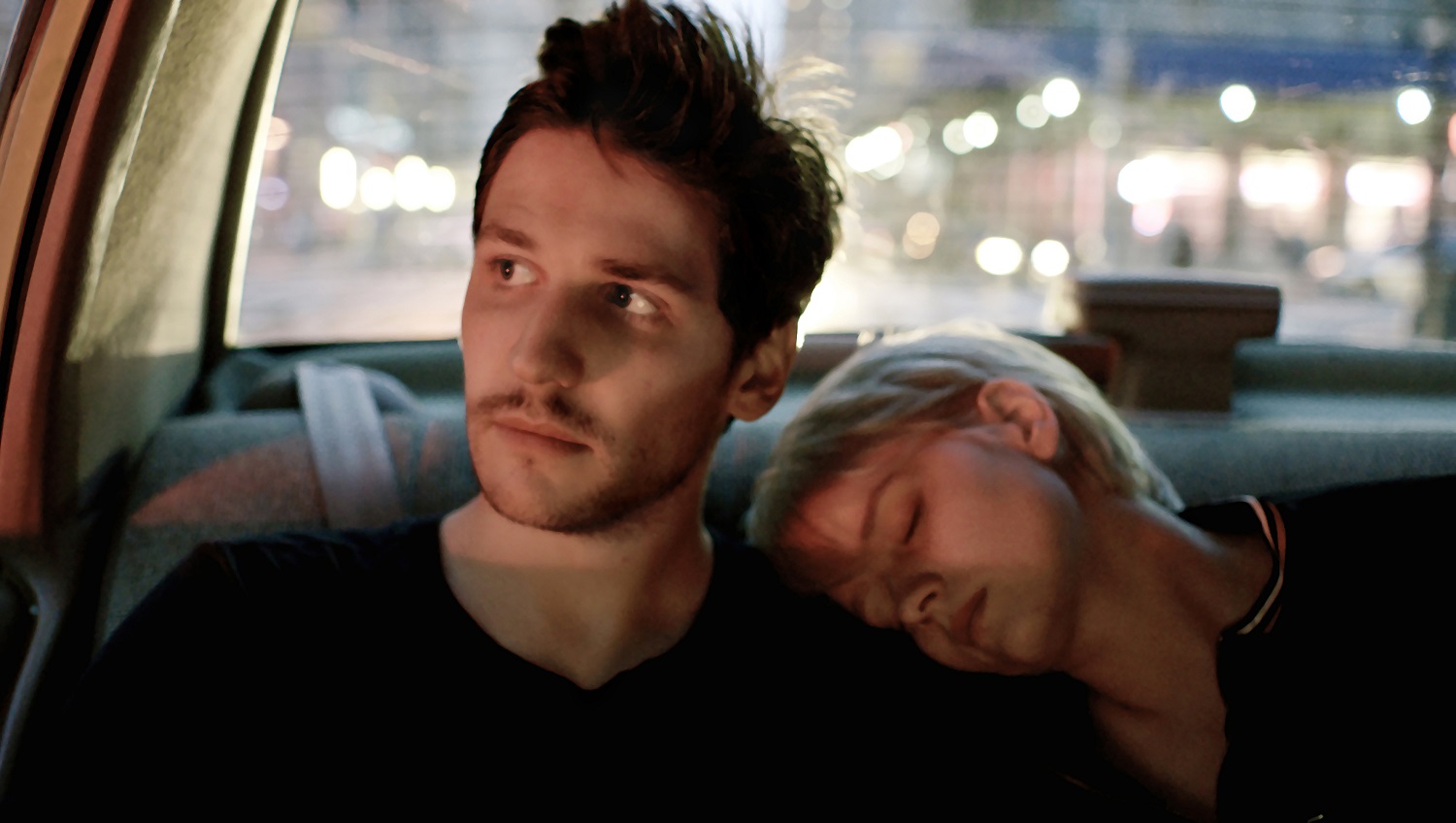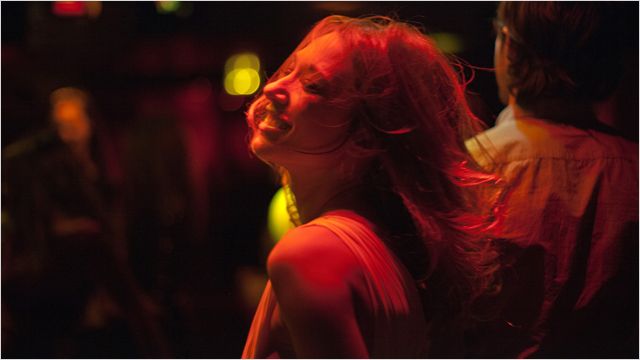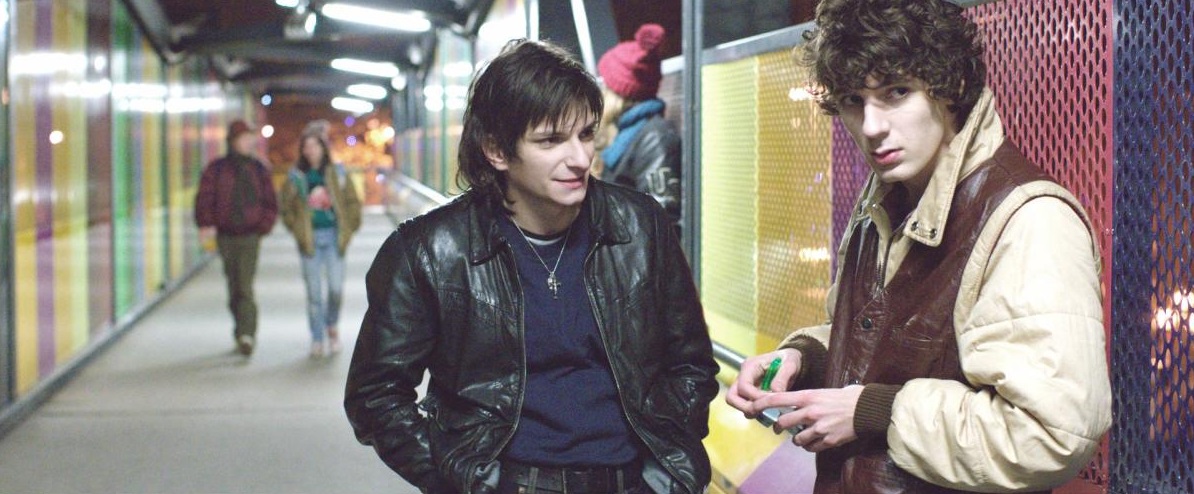Mia Hansen-Løve has a talent for finding the transcendent in life and transforming the everyday struggles of existence into art. Her first feature, All Is Forgiven (2007), was nominated for a Best First Film César Award, but it was with her sophomore effort, The Father of My Children (2009), inspired by the tortured life and tragic suicide of producer Humbert Balsan, that she began to come into her own. She turned to her own youth for her third film, the semi-autobiographical Goodbye First Love (2011). For her latest, Eden, Hansen-Løve collaborates on the screenplay with her older brother, Sven. Like Sven, lead character Paul (Félix de Givry) is a 1990s era electronic music DJ, a pioneer of a sound that came to be known as “French touch.” Paul and his friends, which include his turntable partner Stan (Hugo Conzelmann), hipster girlfriend Louise (Pauline Etienne), and artist Cyril (Roman Kolinka), are part of something fresh and exciting, at least until life starts gumming up the works.
At the Sundance Film Festival where Eden screened in the Spotlight section, Hansen-Løve talks about using her brother’s experience to make larger points about life and how watching her husband Olivier Assayas’ 1960s era autobiographical drama Something in the Air (2012) led her to want to make a statement about her own generation.
Pamela Grady: Eden is an excellent representation of the clash of dreams with reality. You wrote this with your brother, who lived a version of this life. How did you two tackle the story, so that it was not mere memoir but encompassed bigger themes?
Mia Hansen-Løve: My brother and I, we are very different, but something we had in common and we probably have that in common with a lot of other people is a certain idealism and obstinacy about that, the difficulty in getting over that. In his own way, my brother is still as idealistic as he was and yes, there is disillusion and a certain cruelty of life towards dreams and faith in ourselves and self-confidence, but even though there is all of that and failure and sadness, I don’t think it was in vain. I don’t think we shouldn’t have lived that life and that’s not how I looked at the character.
One thing that is interesting, when I talk to people who have seen the film, you really have two kinds of reactions. Some people connect with the innocence the characters have and even though they see melancholy in the film, they don’t think it’s meaningless. You have other people who only see the failure, the fact that he didn’t build a life. For me, making this film was about trying to see the meaning of it, not about saying, ‘This is all in vain,’ or, ‘Look how bad it all went.’ You can see it that way, but you can also feel empathy for this character who wants to stay faithful to his dreams and to his childhood in a way.

Grady: In a sense, the movie is not so much about abandoning dreams as growing up and gaining experience.
Hansen-Løve: The more [life] goes, the more I think like that. When I was in my twenties and I wanted to make films, I was obsessed with creating and moving on and doing things, because it was a way to escape things in my life, it was a kind of self-protection. But the more it goes, maybe because I’ve done four films and I feel relaxed about it, the more I grow up inside, the more I become convinced that we have to experience life in order to transmit feelings about it.
The film is also about modernity. At some point in the nineties, this music that I am talking about represented modernity and youth.
Grady: You capture the ephemeral nature of youth through the music. The film also reminded me of a friend’s assertion that the music that you love when you’re seventeen, that’s what imprints on you.
Hansen-Løve: Totally. It’s not only the music. The things that are important to us, that are crucial when we are seventeen, that really defines us for our whole lives. Sometimes we can change our minds, but still, there are some things that stay with us, very structurally, especially music. That’s what I realized. It was after seeing Olivier Assayas’ Something in the Air, for the first time actually I started thinking of what would it be, if I made my own film about my generation. It wouldn’t be about politics, not during that time. It’s not that we didn’t have any values or beliefs, it’s just that we didn’t trust the politicians to represent them, so we had to find some other mental space to look for freedom and utopia, and that was music.
It was really the one thing that kept me moving when I was seventeen, eighteen. It was the one thing that made me feel happy, dancing and going to these parties. It can sound infantile, but I don’t think it was. Today, I think it can seem vain or superficial, but I think it’s because the relationship of people to parties and music has changed. There are still people who are passionate, of course, but the parties I am talking about, the ones I used to go with my brother when I was very young, they were parties where people would go really for the music in order to experience the music collectively. There was a true communion with the music. People were really listening to it and knew the songs and would sing along. Can you imagine that in a club today? Everybody singing, that was quite beautiful. Also, because there were very different people in these places where it all started. Of course, you had these fashion people and very cool people, but you also had people coming from everywhere, not just from Paris, but from the suburbs. It was very mixed. Also in terms of skin. You had white, black, Asian. I don’t think it’s like that anymore, at least not to the parties I’ve been to in Paris. You don’t have this spirit of openness and spontaneity.

Grady: Early on in the film, you have a character Cyril, who is on his own path that parallels Paul’s. He seems like he is going to be a major character, but then he’s gone, yet even in his absence, he feels important.
Hansen-Løve: Thanks for mentioning him. I don’t know why, but in the U.S., I get much less comments about him than in France. For me, he is an important character. To me, he is somehow in the center of my cinema in general. What I mean is, in a way, he is almost closer to the characters in my previous films than Paul. He was there from the start in my mind, inspired by someone my brother and I knew, a close friend of my brother, who committed suicide in 2002, who was great drawer who was never really famous. He was extremely talented. His only piece of work that was published was a comic book about electronic dance music. He was very close to the character in the film and also the physical presence of the actor, because he was a very handsome young man, but very tortured and very dark.
For the character, my feeling is that his darkness helps Paul from going that way…This darkness has an impact on him and an influence on him. It’s part of him, but at the same time, it maybe reminds him of his desire to go in another direction. This character is very close to me and the actor, Roman Kolinka, I’m very fond of him. He been in a couple of things, but this is one of his first parts. I think he has an amazing presence and I have a project with him in the future. I want to keep working with this actor.
Something that moves me about the character is that he’s kind of tough. He’s kind of cold. He doesn’t try to be sympathetic. That’s where I think the actor succeeded so well in playing that. He’s more moving, because of the fact that he doesn’t try to be. That’s something really special. That’s something I really like about actors, when the emotions come from not trying to make you feel compassion about them.

Grady: He’s not the only actor who is striking. Félix de Givry is so great at portraying Paul’s sweetness and vulnerability and callowness.
Hansen-Løve: The first time I saw Félix’s face was when Olivier Assayas was casting Something in the Air and he was hesitating between two actors. It was the very end of the process. One of them was the actor he ended up choosing and the other one was Félix. Félix was sixteen at the time, very young. He was found in the street, he wasn’t a professional actor, but he already had this charisma. It was a very interesting mix of some kind of strong self-confidence and maturity, but at the same time, something childish, something innocent. And he was quite at ease in front of the camera.
I remembered him. When I was casting for Eden, the casting director, who also casts Olivier’s films, remembered him as well. At the time, he was in Los Angeles for his studies, so we had to wait for a year, but I was very curious to see him again. The one thing that made me have quite a strong feeling that it would be him was when we realized he had a music label and was into electronic music. When I met him afterward, he had a real connection with this music, a real passion, a real energy that made it obvious that he was right for the character. People say he looks like my brother. I don’t think so. They’re not so similar, but I guess they’ve spent so much time together since Félix was cast in the film that—when you know you’re going to play a character and you spend time with someone who inspired the character—you get unconsciously influenced by him. I think when we started shooting, Félix was full of my brother’s presence in a way.
Grady: You incorporate Daft Punk in your film in a most unusual and amusing way. How did that come about? I realize your brother’s DJ career parallels their rise, but how did that happen? Why them?
Hansen-Løve: It started with a story they told us, something that had happened a few days before we met them to talk about the script. My brother Sven has known them forever, well, since he was eighteen. There was a small group of young Parisian people who were all connected. He saw them a lot before they were famous. My brother was always a big fan of their music. Then after they became extremely famous, my brother lost of track of them. He didn’t see them anymore. But then we finished writing the script, we went to them. We wanted to have a couple of songs. It was very important. We made this very clear choice from the start to choose them to represent the lightness, the most luminous aspects of French touch, to choose them and not try to have everybody. There are other famous artists we could have tried to have, to have a little bit of everybody to try to make everyone happy, but we thought it was more important to focus on what was really crucial to us. I thought the parallel between them and my brother’s duo was kind of beautiful to show. We needed their support for the songs and also for the script, because we were using their names and their characters. They were very supportive. We were lucky that they understood the script and our intentions, because otherwise I don’t know how we could have made this film as we wanted to. But the story about them in the film is what they told us.



